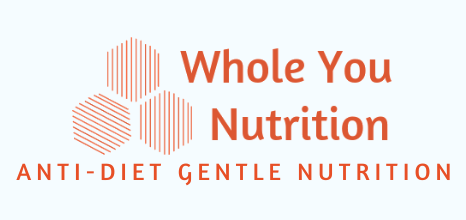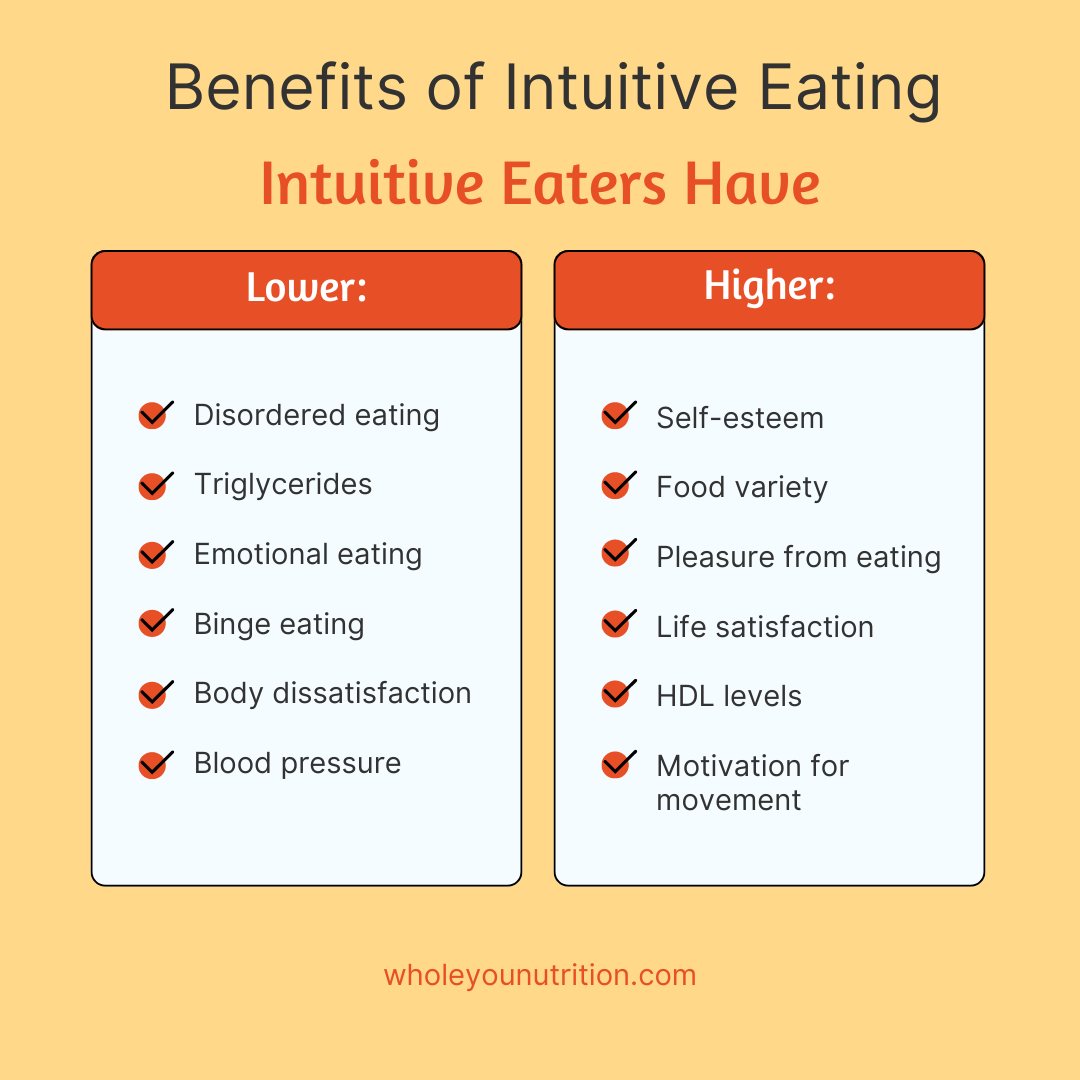The Truth About Weight Loss and Intuitive Eating: What You Need to Know
One of the biggest challenges most of my clients face when undertaking an intuitive eating journey is uncoupling weight loss from food, exercise, and health.
Understandably so. Our society is steeped in diet culture that teaches all of us from a young age that being thin is healthy. Thin is beautiful. Thin is successful. We are taught that food and exercise are the keys to staying thin or becoming thin.
Those myths—that thin equals healthy and that your body size and shape can be easily manipulated by changing what you eat or how you move —are very damaging to your overall health and wellbeing.
Can You Lose Weight with Intuitive Eating?
It is a true statement that you could lose weight while practicing intuitive eating.
It might be a true statement, but it is not the whole story.
Will You Gain Weight if You Start Intuitive Eating?
It is also true that you could gain weight while practicing intuitive eating.
Again, it is not the whole story.
Further, it is true that your weight might not change at all while practicing intuitive eating. Or maybe you will gain weight and then lose weight. Or vice versa.
If you focus on weight, you are missing the point of intuitive eating.
Intuitive Eating is Not About Weight or Weight Loss
The long and short of it is that intuitive eating is not a diet. Not even a non-diet diet. Or an anti-diet diet. Diets are about changing your physical body, usually to make it smaller. Focusing on weight will make it impossible to truly eat intuitively.
Intuitive eating is about changing your relationship with food and your body; it is not about changing your body size.
Intuitive eating is being co-opted by diet culture; it is being used to sell weight-loss diets. This is adding to the confusion about what intuitive eating actually is and how it really works. If someone is touting intuitive eating for weight loss, just know that it is not intuitive eating.
It is also important to know that intuitive eating isn’t anti-weight loss. Changing your relationship with food might very well change your body (it could be weight loss, weight gain, or shifting weight distribution); that is just a body doing what bodies do. Intentional weight loss — doing something specifically for the purpose of shrinking your body size — is not intuitive eating.
Body size is complex and determined by many factors, most of which are out of our control, including genetics, economic stability, access to health care, weight stigma, weight cycling, and environment, to name a few.
Can You Practice Intuitive Eating and Still Want to Lose Weight?
Most people start intuitive eating while still thinking about the size of their bodies or weight loss.
Long-time intuitive eaters also have times when the size of their body or weight loss still penetrate their thoughts. Diet culture is pervasive. It is impossible to completely escape its influence.
It is normal, common, and expected that you will still have conflicting thoughts about weight and your body when you start an intuitive eating journey. Coming to terms with diets, body image, and food messages is built into the intuitive eating framework. It is part of the process.
Three principles in particular stand out to me as specific to working through the complexities of dieting and weight loss.
Reject the Diet Mentality
The very first principle of intuitive eating is to reject the diet mentality. The originators of the intuitive eating movement knew that confronting diet culture was essential to improving relationships with food and body. They made it part of the process.
That means you can start your intuitive eating journey from a place of uncertainty. You don’t have to reject the diet mentality before trying intuitive eating. The principle guides you through processing the harms of dieting and removing dieting thoughts and tools.
Rejecting the diet mentality is part of an intuitive eating practice, not a prerequisite.
2. Challenge the Food Police
You know those little voices in your head that notice and comment on each bite you take? That is the food police. The food police are the voices of diet culture that reinforce that you are “good” if you order a salad and “bad” if you order dessert. These voices thrives on judgment, shame, and guilt.
An important part of reshaping your relationship with food is challenging these voices and beliefs. It is also important to cultivate ally voices that can support and nurture your intuitive eating journey with compassion and neutrality.
Again, this is part of the process of intuitive eating.
3. Respect Your Body
Being mean to your body in how you think about it, talk about it, and treat it will never lead to positive long-term changes. That said, it is not realistic to jump from body bashing to body love just because you hear it is better for you. That is not really how humans operate.
Intuitive eating asks you to start by treating your right-now body with respect. This might mean dressing more comfortably for the size your body is now, instead of the size it was or the size you want it to be. It could also be ditching things like scales, measuring tapes, or “goal” jeans — the external measures of body worth based on size.
Finding respect for your body is built into an intuitive eating journey. It is not something you need to find before coming to the work.
Does Intuitive Eating Work?
If you are asking if intuitive eating works for weight loss, the short answer is no. But if you are asking that, you are also missing the point of intuitive eating.
Intuitive eating provides a framework for improving your relationship with food and your body from the inside out. It focuses on strengthening your ability to listen to and trust your own body’s cues (aka interoceptive awareness) about what to eat, when to eat, how much to eat, and how to move.
Intuitive eating doesn’t promise weight loss, but it does make it easier and more pleasurable to navigate eating and moving your body in a world obsessed with bodies.
If you want support on your own intuitive eating journey from a Certified Intuitive Eating Counselor, learn more about one-on-one services or sign-up for the next Intuitive Eating for Skeptics online course.
The information provided is for educational and informational purposes only. It is not intended to be medical advice or to diagnosis, treat, cure or prevent any disease. This information does not replace a one-on-one relationship with a physician or healthcare professional. Dietary changes and/or the taking of nutritional supplements may have differing effects on individuals.
To learn more about how working with a nutritionist could help you, schedule a free 15-minute call.


